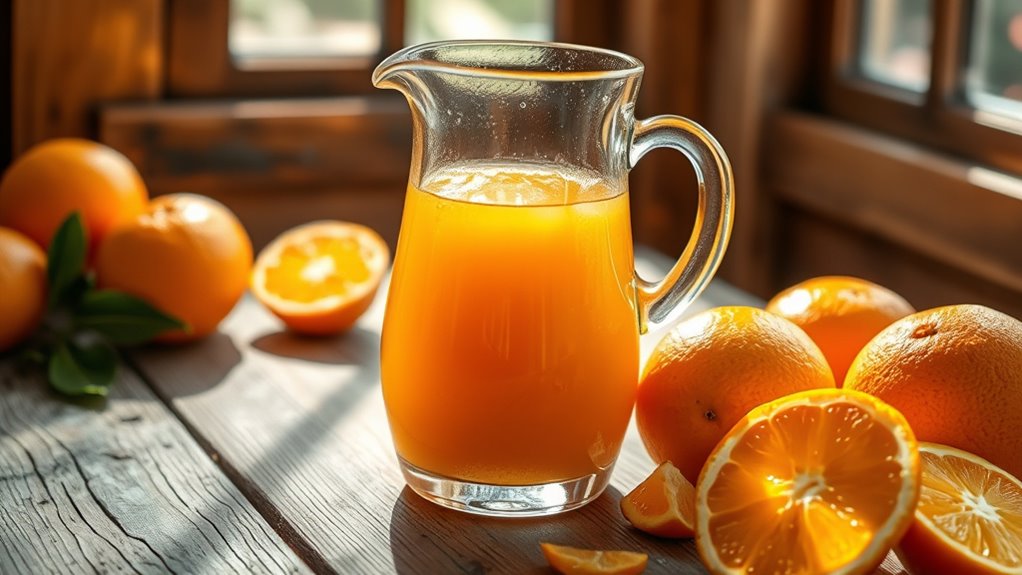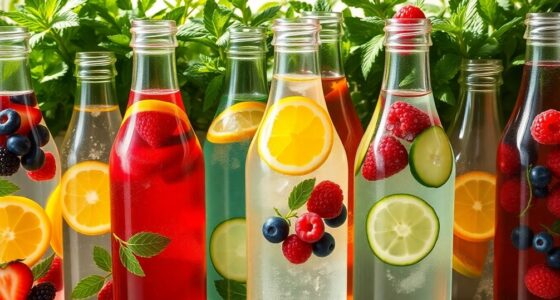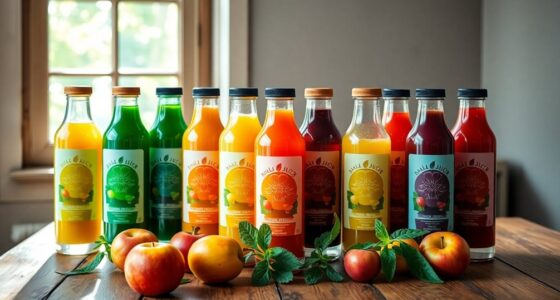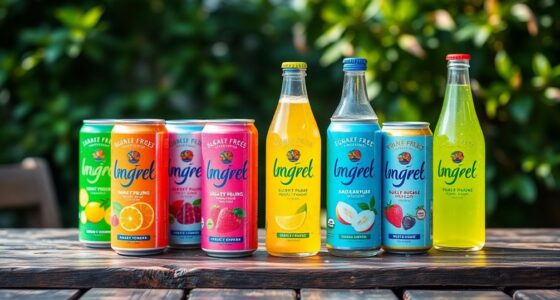When you see “not from concentrate” on Simply Juices, it means the juice has been minimally processed to keep it as close to fresh fruit as possible. It avoids heating, concentrating, or adding water, so you get a product that preserves the natural flavor, nutrients, and authentic qualities of the fruit. This process guarantees a more genuine, fresh-tasting juice. If you want to understand how this impacts quality even more, there’s plenty more to learn.
Key Takeaways
- “Not from concentrate” indicates juice is made directly from fresh fruit with minimal processing.
- It preserves the fruit’s natural flavor, aroma, and nutritional content better than concentrate juices.
- The process involves gentle extraction and low-temperature pasteurization, avoiding extensive heating.
- These juices typically contain fewer additives and preservatives, offering a more authentic product.
- Choosing “not from concentrate” reflects higher quality and closer-to-fresh fruit qualities.
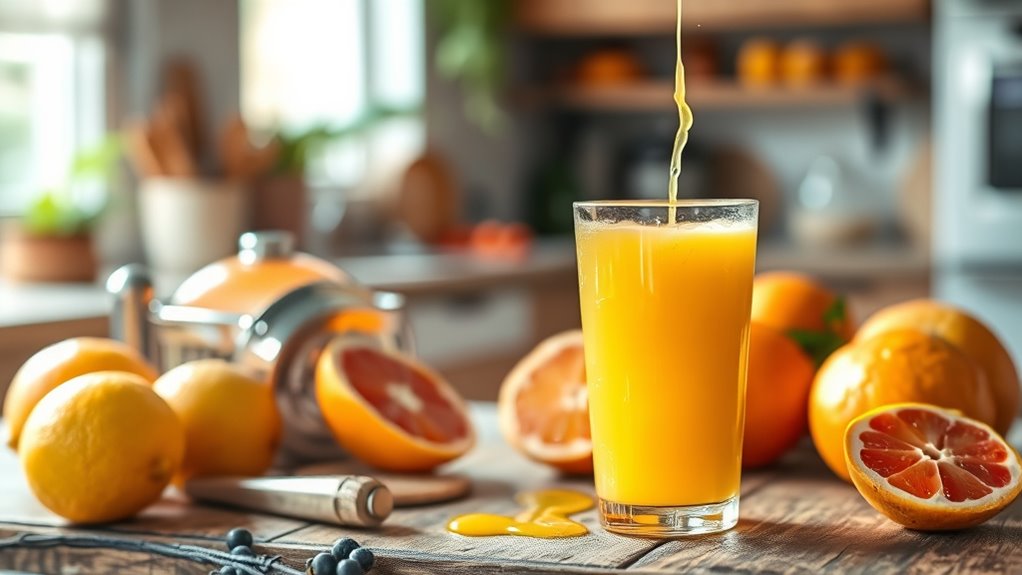
Have you ever wondered how to enjoy fresh, natural juice without the hassle? When you see labels like “not from concentrate” on your juice bottles, it often signals that what you’re drinking is closer to the fruit’s natural state. This process emphasizes fruit purity, meaning the juice is minimally altered from its original form, preserving the true flavor and nutritional content of the fruit. Unlike concentrates, which undergo extensive processing, juices labeled “not from concentrate” are made with a different approach that keeps the integrity of the fruit intact.
Processing techniques for not-from-concentrate juices focus on maintaining fruit purity. These methods typically involve gentle extraction, where the fruit is carefully pressed or crushed to extract the juice without excessive heat or additives. The goal is to keep the juice as close to its natural form as possible, avoiding the concentration process that can strip away some of the flavor and nutrients. Once the juice is extracted, it is usually pasteurized to kill any bacteria, but this step is done at lower temperatures or for shorter periods to preserve more of the original qualities of the fruit. The result is a product that is fresher-tasting and more vibrant in flavor, closely resembling the fruit from which it was made.
Not-from-concentrate juices use gentle extraction and low-temperature pasteurization to preserve fruit’s natural flavor and nutrients.
The key difference lies in how the juice is handled after extraction. Juices from concentrate are heated and then water is added back during reconstitution, which can alter the original fruit profile. In contrast, not-from-concentrate juices skip this concentration step, so they retain more of the fruit’s natural essence. This method guarantees that you’re getting a product that’s less processed, with fewer additives or preservatives, highlighting the authentic fruit flavor. It’s a choice for those who value natural quality and want to experience the true taste of the fruit.
When you pick a “not from concentrate” juice, you’re choosing a beverage that emphasizes fruit purity through careful processing techniques. You get the benefit of drinking juice that is closer to freshly squeezed, without the need for squeezing or extensive processing at home. It’s a straightforward way to enjoy the natural sweetness, aroma, and nutrients of real fruit in every glass. Additionally, understanding the processing methods involved can help you select higher-quality products that retain more of the fruit’s original qualities. Ultimately, understanding what “not from concentrate” means helps you make informed choices, ensuring you’re savoring juice that reflects the genuine qualities of the fruit and not a heavily processed product.
Frequently Asked Questions
How Long Does “Not From Concentrate” Juice Last on the Shelf?
You can expect “not from concentrate” juice to last about 6 to 12 months on the shelf if unopened. To maximize shelf life, follow storage guidelines by keeping it in a cool, dark place away from sunlight and heat. Once opened, consume within 7 to 10 days and refrigerate. Proper storage helps maintain freshness and quality, ensuring you enjoy the juice at its best.
Are There Any Additives in “Not From Concentrate” Juices?
You’ll find that not from concentrate juices typically have minimal additive presence, as manufacturers aim to preserve ingredient purity. These juices often contain just fruit juice with few, if any, added preservatives or flavorings. However, it’s wise to check labels, since some brands might add small amounts of additives for preservation or taste enhancement. Overall, when you choose not from concentrate, you generally get a purer juice experience with fewer additives.
Is “Not From Concentrate” Juice More Expensive?
Think of “not from concentrate” juice as the diamond in the rough of beverages. It’s usually more expensive because the price comparison reveals higher quality and fewer processing steps. You’re paying for fresher taste and better ingredients, making it worth the extra bucks. So, if you care about quality differences and want a richer flavor, expect to shell out a bit more compared to concentrate options.
Does “Not From Concentrate” Juice Retain More Nutrients?
Yes, “not from concentrate” juice generally retains more nutrients because it undergoes less processing, preserving more of the fruit’s natural vitamins and minerals. The processing methods for these juices involve minimal steps, which helps maintain nutrient retention. When you choose “not from concentrate,” you’re getting a product closer to fresh juice, making it a healthier option that preserves more of the fruit’s original nutritional value.
Can “Not From Concentrate” Juice Be Frozen?
Freezing ‘not from concentrate’ juice is totally doable and can preserve its flavor retention remarkably well. You can freeze it to extend its shelf life without losing quality. Just make sure to store it in airtight containers to prevent freezer burn and flavor degradation. Freezing preservation keeps the juice fresh, vibrant, and ready to enjoy whenever you want, making it a smart choice for juice lovers who want maximum freshness.
Conclusion
Now that you know what “not from concentrate” really means, you can make smarter choices. Imagine choosing a juice labeled this way at the store, knowing it’s made from fresh-pressed fruit without added concentrates. For example, Sarah switched to these juices and noticed a fresher taste and better quality. Next time, check those labels and pick “not from concentrate” for a more natural, authentic juice experience. Your taste buds—and health—will thank you.
Cindy thoroughly researches juicing trends, techniques, and recipes to provide readers with practical advice and inspiration. Her writing style is accessible, engaging, and designed to make complex concepts easy to understand. Cindy’s dedication to promoting the advantages of juicing shines through her work, empowering readers to make positive changes in their lives through the simple act of juicing.

